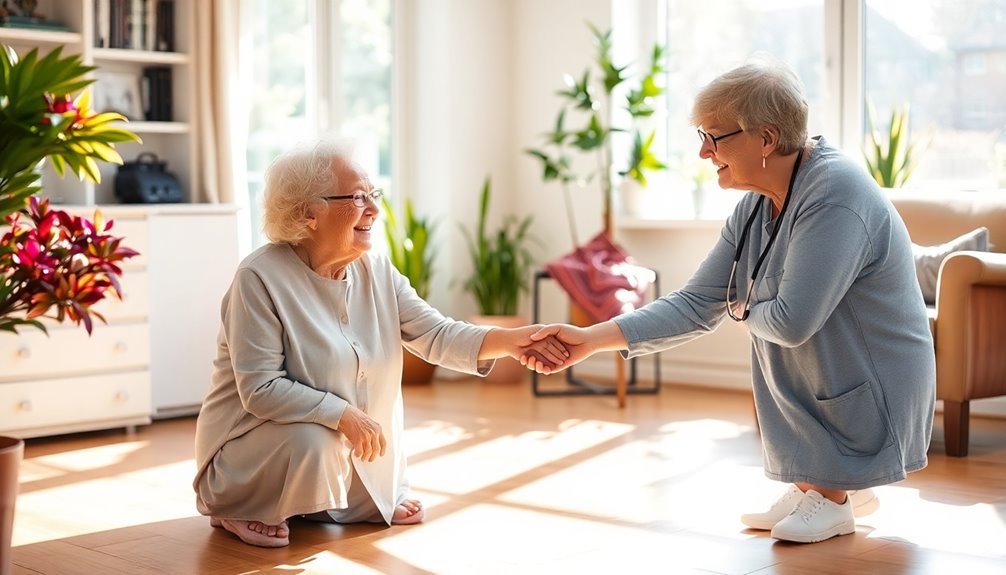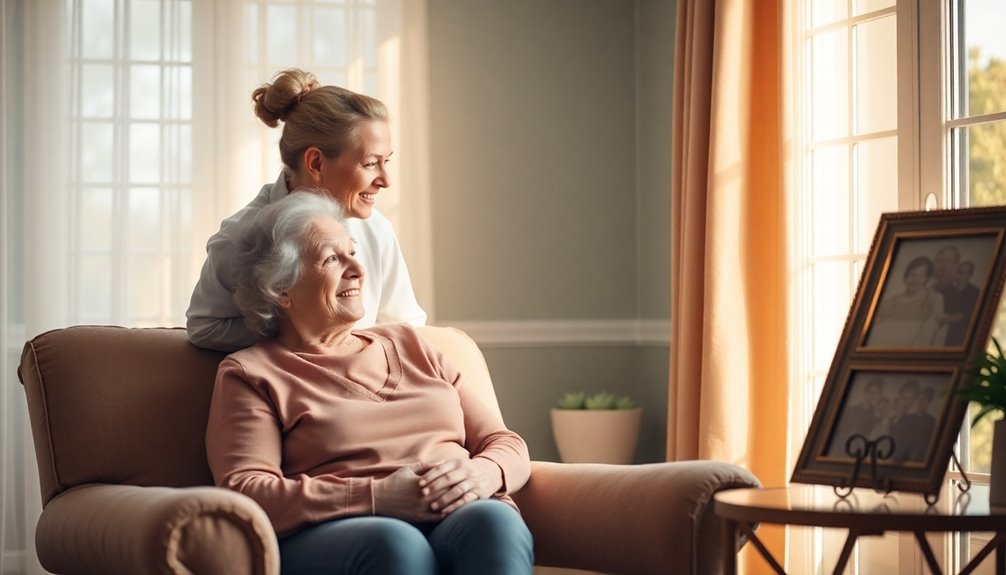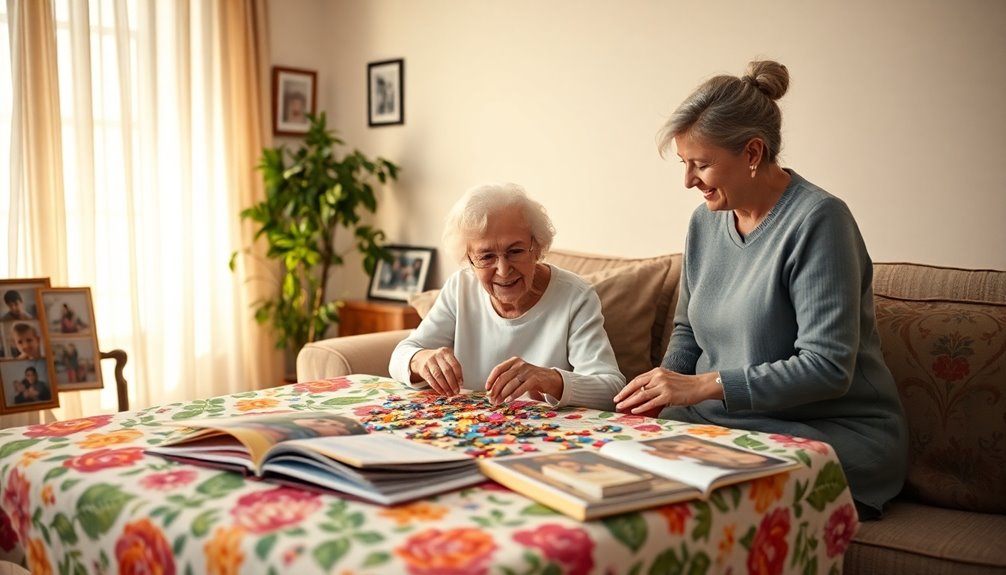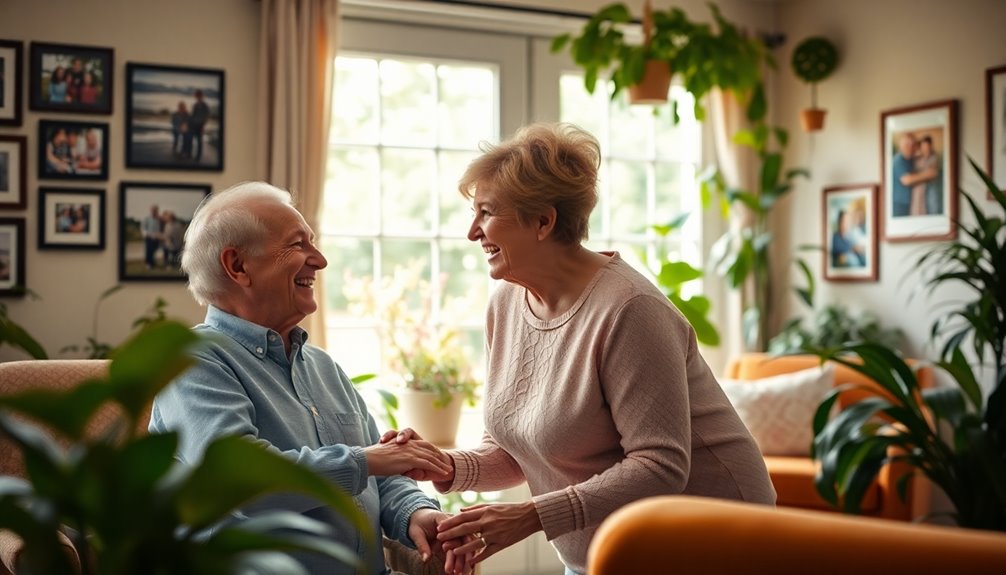To provide exceptional elderly care, you must understand the unique needs of older adults. Compassion and patience are essential for building trust and improving their emotional well-being. Effective communication strategies help you connect better with clients, while creating meaningful experiences uplifts their spirits. Engaging in activities that stimulate the mind enhances their cognitive function too. If you're curious about how these insights can transform your caregiving approach, there's so much more that awaits you.
Key Takeaways
- Compassionate caregiving significantly enhances emotional well-being and quality of life for elderly clients, reducing feelings of isolation.
- Active listening and patience improve communication, building trust and cooperation with older adults, especially those with dementia.
- Creating shared experiences, like storytelling or cooking, fosters emotional bonds and combats loneliness in seniors.
- Regular social interactions and activities stimulate cognitive function, promoting brain health and reducing the risk of cognitive decline.
- Open communication between caregivers and families is essential for understanding care needs, ensuring exceptional elderly care.
Understanding the Unique Needs of the Elderly

As you navigate the world of elderly care, it's essential to recognize that older adults have unique needs that differ markedly from those of younger individuals.
Their unique healthcare needs often arise from chronic conditions, with about 80% facing issues like heart disease or diabetes that require ongoing management.
You'll also encounter age-related changes in sensory perception, such as vision and hearing loss, which can complicate communication and safety. VA Rating Criteria for Bilateral Hearing Loss can provide insight into how hearing impairment is assessed and rated, which is vital for many elderly individuals.
Additionally, many seniors experience social isolation, making emotional support critical for their well-being.
Understanding their spiritual and emotional desires for connection and purpose can greatly enhance your caregiving approach.
The Importance of Compassion and Patience

Compassionate caregiving considerably enhances emotional well-being, as studies show that empathy improves the quality of life for those in your care.
Patience is equally crucial; older adults often need more time to process information and respond. A calm demeanor not only reduces anxiety but also fosters better communication.
By practicing active listening and validating their feelings, you can decrease behavioral issues, especially in dementia patients.
Furthermore, when you exhibit patience and understanding, it builds trust, improving cooperation with care plans.
This compassionate approach can alleviate feelings of isolation, leading to increased satisfaction and happiness among elderly individuals. Additionally, ensuring proper hearing evaluations can significantly enhance interactions, as effective communication is vital for emotional connection.
Effective Communication Strategies for Caregivers

Effective communication is key to quality elderly care, so you should establish open channels with caregivers right from the start. Regular check-in meetings help everyone stay on the same page and address any concerns promptly. Additionally, fostering open communication can significantly enhance the caregiving experience and ensure that the needs of the elderly are met effectively.
Open Communication Channels
Open communication channels are essential in ensuring that caregivers feel supported and informed about their loved ones' needs.
Establishing regular check-in calls or video chats can enhance this communication, making it easier for you to share updates. Use open-ended questions to uncover caregivers' concerns and preferences, fostering a collaborative relationship.
Creating a daily checklist for tasks can clarify expectations and reduce misunderstandings between family members and caregivers. Engaging in face-to-face visits at different times helps family members assess care quality while building rapport with caregivers.
Additionally, designating a contact person within the caregiver's administration streamlines communication, ensuring that important updates and concerns are addressed promptly.
This approach not only improves care but also strengthens relationships.
Regular Check-In Meetings
Regular check-in meetings can greatly enhance communication between caregivers and family members, guaranteeing everyone stays informed about the loved one's care.
By scheduling weekly video calls or in-person visits, you can provide updates and address concerns promptly, which boosts the quality of care for your loved one.
Establishing a designated contact person within the caregiver's team can streamline communication, reducing confusion and improving support.
Engaging in these regular check-ins fosters trust and collaboration, creating a respectful relationship between caregivers and family members.
Additionally, using structured methods like daily checklists or open-ended questions clarifies expectations and improves the caregiving experience.
Embrace regular check-in meetings to guarantee effective communication and superior care for your loved one.
Creating Meaningful Connections With Clients

By actively listening and engaging in shared experiences, you create a bond that fosters emotional health. These connections not only enrich their lives but also enhance your caregiving experience. Furthermore, pet therapy can significantly improve emotional well-being, providing companionship and reducing feelings of isolation for elderly clients.
Building Trusting Relationships
Building trust starts with open communication, allowing you to understand your clients' preferences and needs. Regular check-ins promote a sense of partnership, keeping you connected to their evolving requirements.
Simple gestures of appreciation can strengthen the caregiver-client relationship, fostering a positive atmosphere. Engaging clients in discussions about their care preferences guarantees that the care you provide is respectful and personalized.
Furthermore, frequent face-to-face interactions can enhance clients' emotional well-being, as strong relationships contribute to improved health outcomes. Additionally, being aware of filial responsibility laws can help caregivers navigate financial discussions with families more effectively.
Engaging Through Active Listening
Establishing trust with elderly clients naturally leads to deeper connections through active listening. By fully concentrating and understanding what they say, you show that their thoughts and feelings truly matter.
Active listening not only reduces feelings of isolation but also enhances their mental and emotional well-being. Use techniques like paraphrasing and summarizing during conversations to clarify their needs and preferences, allowing for personalized care.
Asking open-ended questions invites richer dialogue, further strengthening your bond. When elderly clients feel heard and understood, they experience greater satisfaction with their care, making your role more rewarding.
Engaging through active listening creates a positive environment for both you and your clients, fostering meaningful connections that elevate the quality of care. Additionally, maintaining consistent routines can significantly improve the overall well-being of elderly clients, providing them with a sense of stability and security.
Encouraging Shared Experiences
Creating meaningful connections with elderly clients hinges on encouraging shared experiences that foster emotional bonds and a sense of belonging. Engage in activities like reminiscing about past events, cooking together, or gardening.
These shared experiences enhance emotional connections and improve mental well-being. Regularly scheduled game nights or movie viewings can lift your clients' moods and reduce feelings of isolation, as they enthusiastically anticipate these interactions.
Utilize storytelling to allow them to express their life stories, boosting their self-esteem and offering insights into their identity.
Don't overlook technology; virtual shared experiences, like video calls with family, can bridge distances and maintain essential social connections, fundamental for their emotional health. Additionally, incorporating the Law of Attraction principles can help foster a positive mindset, which is crucial for their overall well-being.
Embrace shared experiences to enrich your caregiving journey.
Engaging Activities to Uplift Spirits

Engaging in uplifting activities can greatly enhance the spirits of elderly individuals, as these experiences provide both mental stimulation and social connection.
Try encouraging creative activities like painting or drawing; they help express emotions and reduce stress, even for beginners. Gardening is another fantastic option, offering physical exercise and therapeutic benefits while fostering a connection with nature.
Group activities, such as playing musical instruments or knitting, can combat loneliness and promote cognitive stimulation. Don't forget the joy of cooking—exploring new recipes stimulates cognitive functions and makes mealtime more enjoyable.
Regular physical activities like hiking and walking not only improve cardiovascular health but also create meaningful interactions with friends and family. Additionally, incorporating age-appropriate activities can ensure that the engagements are suitable for their abilities and interests.
Embrace these engaging activities to uplift their spirits!
Recognizing Personal Interests and Preferences

Recognizing personal interests and preferences is essential for enhancing the quality of life for elderly individuals. When you understand their personal interests, you can engage them in activities like gardening, reading, or painting, which promote emotional well-being and reduce feelings of isolation.
Regularly discussing their preferences for daily routines, meals, and social interactions fosters a sense of autonomy and respect. Incorporating hobbies they enjoyed earlier in life can trigger positive memories, keeping them mentally engaged. Additionally, understanding the role of dementia medications can help tailor activities that align with their cognitive abilities.
Always seek their feedback and involve them in decision-making about their care. By honoring and respecting their personal interests, you create a more fulfilling and satisfying environment, making a significant difference in their overall happiness and well-being.
Enhancing Emotional Well-Being Through Care

While providing care for the elderly, enhancing their emotional well-being should be a top priority. Studies show that positive emotional states can boost cognitive function and overall health in older adults.
Engage in open communication with your loved ones; it greatly increases emotional satisfaction for both of you. Incorporating mindfulness and spirituality into your caregiving routine can reduce stress and foster resilience, creating a supportive emotional climate. Additionally, encourage regular social interactions and community involvement to combat loneliness and depression.
Finally, express gratitude and appreciation regularly, as it enhances the emotional atmosphere and promotes happiness and purpose in your caregiving relationship. Moreover, fostering secure attachment bonds can significantly improve the quality of care and emotional support you provide.
Promoting Mental Stimulation in Daily Care

To promote mental stimulation in daily care, it's essential to incorporate activities that challenge cognitive abilities. Engage elderly individuals with puzzles and memory games, as these can greatly enhance mental stimulation and improve overall brain function.
Daily routines that include conversation, storytelling, or reminiscing about past experiences foster connections and boost mental engagement. Encourage learning new skills, like playing an instrument or painting, to promote neuroplasticity and enhance memory retention.
Regular social activities, such as book clubs or group discussions, help reduce feelings of isolation, which is critical for mental health. Finally, provide opportunities for problem-solving through board games or interactive technology to stimulate the brain and potentially slow cognitive decline.
Your efforts can make a meaningful difference!
Building a Supportive Environment for Thriving

To create a thriving environment for elderly care, you need to prioritize open communication between caregivers and families.
By fostering collaborative dynamics, everyone can better understand care needs and preferences.
This proactive approach not only builds trust but also enhances the overall care experience.
Encourage Open Communication
Effective communication is essential in facilitating exceptional elderly care, as it fosters a supportive environment where both caregivers and loved ones can thrive. By encouraging open communication, you can enhance relationships and make sure everyone's on the same page. Here are some strategies to evaluate:
| Strategy | Purpose |
|---|---|
| Discuss preferred contact methods | Keeps communication efficient |
| Schedule weekly check-ins | Maintains consistent updates |
| Designate a family member | Allows candid conversations |
| Use daily checklists | Clarifies roles and responsibilities |
| Engage caregivers in dialogues | Fosters support and collaboration |
Implementing these strategies will help you create a nurturing atmosphere, leading to better care for your loved one and improved well-being for everyone involved.
Foster Collaborative Care Dynamics
Creating a supportive environment for elderly care becomes considerably easier when you foster collaborative care dynamics among all involved.
Establishing open lines of communication with family members and caregivers promotes transparency, clarifying care expectations and responsibilities. Regular check-ins help build trust, ensuring caregivers feel supported in their roles.
Use tools like daily checklists and defined roles to encourage mutual respect, reducing misunderstandings in care. Collaboration among multiple caregivers enriches the care experience, offering diverse perspectives and alleviating burnout through shared responsibilities.
Don't forget to show appreciation for caregivers, whether through thank-you notes or small gifts. These gestures strengthen relationships, motivate caregivers, and ultimately enhance the quality of care your loved ones receive.
Partnering With Caregivers for Better Outcomes

When you partner with caregivers, open communication becomes essential to ensuring your loved one receives the best care possible.
Establishing trust with caregivers allows for a shared understanding of your loved one's needs and preferences. Setting clear expectations helps to maintain mutual respect and reduces misunderstandings.
Regular check-ins can keep you engaged and aware of the quality of care being provided.
- Encourage caregivers to share their feedback
- Use daily checklists to outline tasks
- Show appreciation through simple gestures
- Conduct regular in-person or phone assessments
Frequently Asked Questions
What Is a Beautiful Quote About Caregivers?
A beautiful quote about caregivers that resonates deeply is by Aldous Huxley: "To care for anyone else enough to make their problems one's own, is ever the beginning of one's real life."
This highlights the profound empathy and connection you cultivate in caregiving. It reminds you that your dedication not only impacts others but also enriches your own life, fostering a sense of purpose and fulfillment that's truly invaluable.
How Much Do Family Members Get Paid for Caregiving?
When it comes to family caregiving, compensation varies considerably.
You might find that about 24% of family caregivers receive some payment, which typically ranges from $10 to $15 per hour, depending on the care level and location.
Some states, like California and New York, even offer Medicaid programs to help pay family caregivers.
Additionally, you can explore tax credits, like the Child and Dependent Care Credit, to ease financial burdens.
What Are Signs of Caregiver Stress?
Caring for someone can feel like juggling flaming torches; one slip and everything might come crashing down.
You might notice signs of caregiver stress manifesting physically, like fatigue or headaches.
Emotionally, you could feel overwhelmed with anxiety or frustration.
If you're withdrawing socially or neglecting your own needs, that's a red flag.
Cognitive issues, like trouble concentrating or memory lapses, can also hinder your ability to provide the best care.
Recognizing these signs is essential.
What Should a Caregiver Not Do?
As a caregiver, you shouldn't make decisions for the elderly without their input.
It's essential to respect their autonomy.
Don't neglect your own self-care, either; burnout can harm both you and those you care for.
Avoid using dismissive language, as it can lead to feelings of isolation.
Keep communication open about preferences and concerns, and never isolate them from their social networks; connections are important for their mental and emotional well-being.
Conclusion
As you commence on this journey of caring for the elderly, remember that revealing their potential is just a step away. With compassion, effective communication, and engaging activities, you can create a nurturing environment that transforms lives. But there’s one secret—one surprising strategy—that many caregivers overlook. Embrace it, and you might just witness a remarkable change. Are you ready to discover what #5 really is? The answer could redefine your approach to elderly care forever. By incorporating vital health tips for seniors into your care routine, you not only enhance their physical well-being but also uplift their spirits. Simple practices like promoting hydration, encouraging regular exercise, and ensuring proper nutrition can make a world of difference. As you integrate these strategies, you’ll likely see not just improved health, but also greater joy and engagement in their daily lives.









